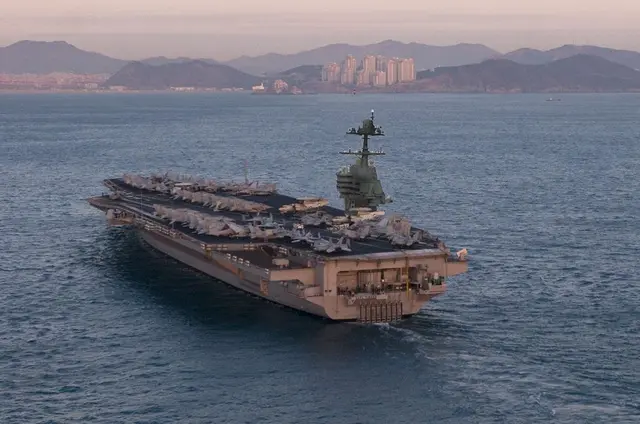Translated by Ye Shan
Turkey has been conducting military operations in the northern Syrian region of Afrin for nearly a week.
There is no sign of an end to the fighting, though all parties including the United States and the European Union (EU) have mediated between the two countries.
On Jan. 25, Turkish President Recep Tayyip Erdogan visited the troops stationed near the conflicted area and said that Turkey would only stop its military operations when its goal has been reached.
In the past few weeks, Turkish armed forces have repeatedly shelled against the "People's Protection Force" in the Afrin area and have allocated tanks and other equipment to the Turkish-Syrian border. The "People's Protection Force" in the region is considered by the Turkish government as a branch of the kurdistan Workers' Party (PKK) in Syria.
On January 21, the headquarters of the general staff of the Turkish armed forces announced a ground military operation in the area which was codenamed "Olive Branch Operation". From a previous tough warning, cross-border shelling to a ground operation, the escalation of Turkish military operations in Afrin is closely related to the confirmed effort of the United States’ multinational coalition against the Islamic State to build "border security forces."
On Jan. 14, the multinational coalition spokesman Ryan Dillon said that the multinational alliance and the Syrian army are trying to build a border security force, the ultimate goal of which stands at about 30,000 troops. The U.S. move sparked a wave of outrage and immediate opposition from countries such as Syria, Russia, Turkey and Iran. The Syrian foreign ministry issued a statement strongly condemning the U.S.-led international coalition for its flagrant violation of Syria's sovereignty, unity and territorial integrity and also of international laws.
Russia, Turkey and Iran have also accused the United States of blatantly interfering in Syria's internal affairs and trying to split Syria. The move has triggered strong opposition because it was a move by the United States to hamper the four countries aforementioned.
First of all, as the focus of the Syrian crisis shifted from fighting against the Islamic State to political reconciliation process, the United States intended to increase pressure on the Assad administration by increasing support to the opposition, in order to achieve its goal of influencing Syria's future political arrangement.
Second, Russia has not only consolidated its geostrategic pivot in the Middle East through military intervention in Syria, but also established its geopolitical position in the Middle East. The United States intends to strengthen its military presence to weaken Russia's influence in Syria and the Middle East, especially as Putin ordered the withdrawal of troops from Syria.
Thirdly, after the failed military coup, Turkey is edging closer to Russia and away from the West. Joining the tripartite cooperation mechanism and purchasing the S-400 air defense missile system from Russia have shown Turkey's increasing alienation, which has led to unrest among the United States and NATO campaign. To this end, the United States clearly wants to restrain Turkey with the Kurdish question.
Finally, Iran input its military forces in Syria with the opportunity of fighting against the IS, making the United States and Israel feeling threatened. The increased U.S. military presence in Syria is in consideration to appease Israel and prevent Iranian infiltration.
Undoubtedly, Turkey reacted the most intensely to the U.S. move to establish a border security force in Syria. Erdogan has made it clear that he wants to "nip this army in the bud." On the Turkish side, the border security force rely on the Syrian Democratic Forces which is composed of Syrian Kurds and Arabs, but with the Kurdish armed "troop of the people's protection” as its core. Once the "troop of the people's protection” and the Syrian Democratic Forces combine and flourish, it is bound to form incentives and support to the PKK, which will threaten Turkey's national security and social stability.
In addition, the first local elections in the Kurdish-controlled area in northern Syria on Sept. 22 last year drew wide attention. Three days later, the Iraqi Kurdish autonomous region held a referendum on independence. With the ongoing Syrian civil war and the rise of the IS, the Kurds once again get the opportunity to realize the dream of building a country. Against the backdrop, Turkey will not allow the Kurds to take any chance of growing its influence in order to avoid a demonstration effect on the millions of Kurds in its own territory.
Erdogan has said that the operation will be completed in a very short period, stressing that the aim of the Turkish military operation is to "clean up" the Kurdish people's protection force in the Afrin area.
It seems that Turkey clearly defines the cross-border strike as a limited and controllable operation, mainly in order to eliminate the potential security threats on the border and to set a "red line" to the United States’ support to the armed Syrian Kurdish forces. However, it is worth noting that the Turkish military operation will still have an impact on the situation of the geopolitical game on the Syrian issue.
On the one hand, because of Russia’s need for bringing in Turkey and Iran is also facing the problems of Syria and the Kurdish, both have acquiesced in the military action. The move by Russia and Iran, in exchange for closer cooperation with Turkey on the issue of Syria, has also raised Turkey's voice on the Syrian issue.
Turkey, on the other hand, has breached the latest U.S. attempt to increase its presence in Syria, but it is still difficult for the United States to give up the important geopolitical chip of Syrian Kurdish armed forces. It is expected that the conflicting U.S.-Turkey relations could be prolonged and complicated.
(ASIA PACIFIC DAILY)
 简体中文
简体中文

